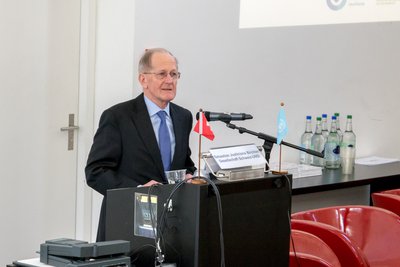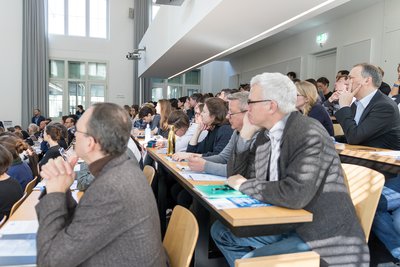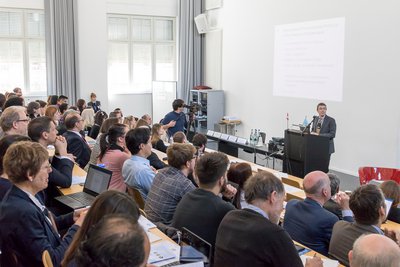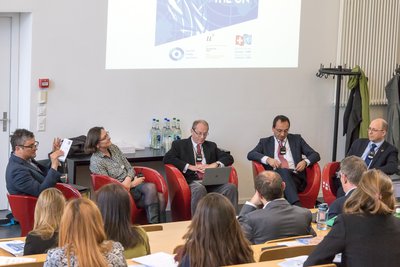27 Mar 2018
1st Swiss UN day hears call for countries to put common concerns first
Environmental change, trade wars and migration - the international community is currently facing huge challenges. Switzerland too, 15 years after it joined the United Nations, is challenged to consider its role and whether that includes being a bridge-builder to a better world.
To contribute to the dialogue and to mark the anniversary of Switzerland joining the UN, the United Nations Association Switzerland, the Centre for Development and Environment (CDE) of the University of Bern and the World Trade Institute co-hosted the first Swiss-UN Day on 23 March.
More than 230 people attended the event held at the University of Bern. Some 20 panellists from international organisations, academia, civil society, political organisations and the Swiss administration took part in three sessions and a concluding roundtable discussion.
In his opening address, Joseph Deiss, former Swiss cabinet minister and president of the UN General Assembly in 2011, recalled the moment when the red and white Swiss flag was hoisted at the UN headquarters in New York. The UN with all its members was like Switzerland with its cantons, he said, and actions needed to be based on general consensus. The current environmental, economic and social problems facing the international community cannot be resolved by individual states acting alone, Deiss said: “Every country, including Switzerland, is called on to put common concerns first.”
Emilia Pasquier, Director of the Swiss foreign policy think-tank Foraus, addressed the issue of gender equality, showing how the UN and Switzerland could inspire and “mutually enrich” one another. Switzerland is a world leader in democracy and innovation, she said, but has much to learn in terms of pay equality and the integration of women in the labour market.
Tackling climate change
The first panel on ‘Reconciling environmental limits and economic growth: Is the UN fit for purpose?’ highlighted the diversity of members’ views on the 2030 Agenda for Sustainable Development and associated goals. CDE Director Thomas Breu, who moderated the session, said that as a result there were “huge challenges” associated with implementation.
Swiss environmental ambassador Franz Perrez pointed out that Switzerland was “more affected than the average country by climate change” and therefore had an interest in ensuring an effective climate policy. As a small yet respected UN member that had contributed to the Paris climate agreement, Switzerland could build a bridge between the different parties and ensure climate targets are not watered down. :
Oceane Dayer of Swiss Youth for Climate summed up the importance of acting now. “Not just future generations but also today’s are suffering the effects of environmental disasters,” she said.
The second panel on ‘The UN and Support for Economic Development - below the radar of high politics’ brought together representatives of different international organisations and was moderated by Professor Damian Raess of the WTI.
Monica Rubiolo of the Swiss Secretariat for Economic Affairs (SECO) spoke about how the government body was an important donor to the International Labour Organisation (ILO), a UN agency, and was cooperating with it to support better working conditions along value chains. It was possible to increase productivity and efficiency while improving work conditions, she said.
Another speaker, Hamed al-Kady of the United Nations Conference on Trade and Development (UNCTAD), identified a need to make the international investment regime work for sustainable development. Agreements signed 30-40 years ago don’t reflect today’s priorities in this regard, he said.
Making progress on migration
The third session ‘Towards reaching an internationally actionable plan on migration’ focused on the global compacts on migration and refugees that are set to be agreed this year and that show how conflicting interests can be overcome at the multinational level. The refugee crisis forced states to involve the UN more from 2016, and there has been a move from fragmentation to working together with the participation of non-governmental organisations, said moderator Professor Marion Panizzon.
Although not legally binding, the compacts aim to define “a core of human rights regardless of the migrant’s legal status”, said Ambassador Pietro Mona of the Swiss foreign ministry. As Genevieve Säuberli of the United Nations High Commissioner for Refugees (UNHCR) pointed out, migrants are vulnerable and their rights need to be protected.
There was agreement that the compacts offered a unique opportunity to tackle the issues of “legal” and “illegal” immigration. “Even if we don’t achieve a globally binding solution, this is real progress,” said Professor Walter Kälin, Envoy of the Chair of the Platform on Disaster Displacement.
Need for reform
The event concluded with a high-level roundtable on ‘UN institutional reform and the place of Switzerland in the UN’ moderated by Manfred Elsig, Deputy Managing Director of the WTI.
While talk of reform mainly focused on the Security Council, Professor Thomas Biersteker of the Global Governance Center, Graduate Institute pointed out that reform was constantly underway in the areas of management and procedures. “This is a time for bold ideas and thinking. Often this comes from below and that’s why we need to encourage civil society,” he said.
He believed Switzerland “punched above its weight” at the UN and capitalised on its “soft power” in promoting its ideas and brokering agreement. This was echoed by Salman Bal of the Office of the Director-General at the UN Office in Geneva who said “Switzerland plays in the champions league at the UN”.
Further info
Photos on Flickr





